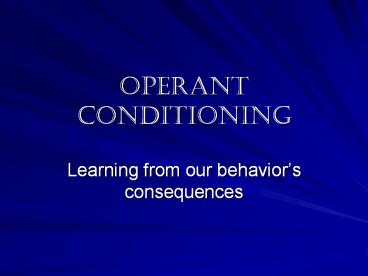Operant conditioning - PowerPoint PPT Presentation
1 / 19
Title:
Operant conditioning
Description:
Operant conditioning Learning from our behavior s consequences Operant conditioning How the consequences of our behavior affects our future behavior Edward ... – PowerPoint PPT presentation
Number of Views:249
Avg rating:3.0/5.0
Title: Operant conditioning
1
Operant conditioning
- Learning from our behaviors consequences
2
Operant conditioning
- How the consequences of our behavior affects our
future behavior - Edward Thorndike started this concept by studying
cats in puzzle boxes - He graphed how their learning progressed over
many trials to reveal the learning curve
3
reinforcement
- An event which increases the future probability
of the most recent response - First explored by Thorndike
- Taken from another perspective, if the delivery
of something makes the action or behavior which
preceded it more likely to occur, it is a
reinforcer - A reinforcer stamps in a response
4
- Thorndike labeled this The Law of Effect
- We are more likely to repeat responses that lead
to (what we view as) favorable consequences or
outcomes
5
- In operant conditioning, we change behavior by
following a desired action/response with
reinforcement - And the sooner, the better
- We label it operant because the subject
operates on the environment to obtain
reinforcement
6
Cc contrast
- Some call it instrumental conditioning because
the subjects behavior is instrumental in
producing the outcome - Stark distinction from classical conditioning
when the subjects behavior was meaningless - Operant subject acts with muscles
- Classical subject reacts through
- internal organs
7
b. F. skinner
- The Father of Operant Conditioning
- Zealous advocate
- Laid out theoretical framework
- Used only the simplest of assumptions
- Pioneered precise operational definitions
- Invented The Skinner Box
- Rats pressed levers, pigeons pecked Os
8
Setting the table for desired behaviors
- How do we get the rat to pull the lever in the
first place? - Shaping establishing a new behavior by
reinforcing successive approximations to it
9
Shaping ii
- Works with rats, pigeons, children, everyone
- Skinners lectures
- Pigeons dropping bombs?
- Catch them while theyre being good
- Token economies
10
Complex behaviors
- How do we get an animal to perform a sequence of
behaviors? - Chaining reinforce each desired behavior by
giving the animal the chance to engage in a
previously reinforced behavior
11
Reinforcement punishment
- These two events drive operant conditioning, and
as a result, much of our behavior - Reinforcement increases the odds that the
behavior which preceded it will re-occur - Punishment decreases the odds that the behavior
which preceded it will reoccur
12
- Reinforcement can result from removing pain or by
helping us avoid it - Going to the dentist
- Taking Tylenol/aspirin
- Finding an excuse not to ask her out
- Settling the big trial
13
SUPERSTITIONS
- We think that our good luck charm prevents us
from screwing up - Same with pre-game rituals
14
More punishment
- Punishment can result from removing pleasure
- If you do that one more time. Ill
- Fouls in a basketball game
- Grounded!
- Time-outs
15
- Does reinforcement simply equal pleasure or pain
equal punishment? - No, reinforcement must increase the frequency of
the behavior. - And, punishment must decrease it.
16
Punishment iii
- Very hard to administer successfully
- Works best if it is
- 1) consistent,
- 2) immediate,
- 3) moderate, and
- 4) alternatives are available.
- Does torture work? Spanking?
17
Finding the right reinforcer
- How can we pick reinforcers that will prompt more
desirable behaviors? - Harder than you might think, great variability
between individuals. - Remember, Skinner virtually starved his pigeons
and rats.
18
Two principles
- Permack the chance to engage in frequent
behaviors can be a reinforcer for less common
behaviors - If that fails,
19
- Disequilibrium disrupting someones typical
routine will make a return to the routine
reinforcing































